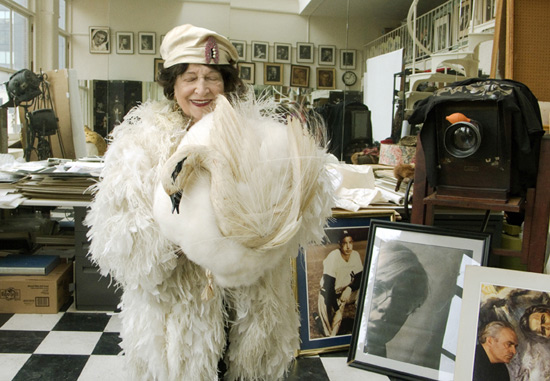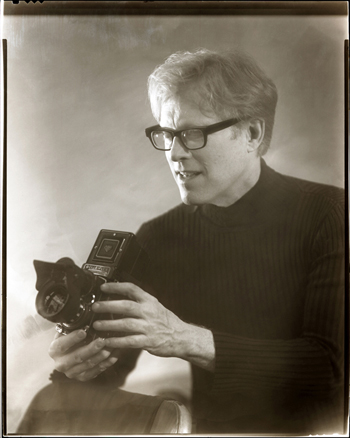A few months ago, Jennifer Fox wrote a guest post for this very site, a three-part, 29-point guide to running a successful Kickstarter campaign. Fox’s groundbreaking documentary My Reincarnation had recently broken all Kickstarter records and would ultimately go on to raise over $150,000, so her posts weren’t just informative and useful, they were a manifesto, a victory lap for the very concept of crowdsourcing.
Over the past decade, I’ve been working on a film called Lost Bohemia, a documentary focusing on the semi-secret world of the Carnegie Artist Studios and the lives of her tenants, including such luminaries as Bill Cunningham and Editta Sherman. The project took a tragic turn in the middle of production, when it was announced that everyone, including myself, was being evicted from these studios due to a series of “renovations” proposed by the Carnegie Foundation. Lost Bohemia ultimately ended up being a chronicle not only of a community but also its destruction, a cautionary tale set in a world corrupted by real estate madness and gentrification.
Now, when I read Fox’s posts, Lost Bohemia was in a similar situation to My Reincarnation: We had a finished documentary that, while well reviewed, had not yet found distribution; naturally, I was inspired to try this Kickstarter thing out myself. I pulled together a team and, following Fox’s wisdom, amongst other sources of Kickstarter-lore, attempted to devise a sucessful campaign. But the best laid plans, etc, etc…
Cut to the 31st of October, 2011. The Lost Bohemia Kickstarter has a 4 days left to raise a third of its target $18,000. The campaign has not been a failure, not by any stretch of the imagination, but it’s scary sitting here, not knowing if we’re going to be able to secure distribution. And so, in light of that, and seeing as it’s Halloween, I give you the Four Scareist Things About Running A Kickstarter Campaign!
1. Technical Difficulties
When we launched on the 5th of October, we had everything set up and ready to go. We had made a great video, reached out through social media, compiled email lists of thousands of prospective donors, sorted out all the financial details; all we had left to do was push the button and LAUNCH. Unfortunately, fate threw a pretty massive gear into the works: for most of the first day, Kickstarter was experiencing some severe technical problems. That meant that a large portion of the people we told about our project went to check it out, saw that the site was down, and promptly forgot about it. This was completely out of Kickstarter’s control, let alone ours; sometimes these things just happen. This is port of the reason why it’s incredibly important to update regularly, to keep circulating the word, to never drop the ball: not only is it just a good idea to keep buzz circulating at all times, but also there will be times when you reach out and people will not be able to reciprocate.
2. Looking for an audience
A crucial difference between Lost Bohemia and My Reincarnation became painfully apparent as the campaign developed. While Reincarnation is, at its heart, a film about the relationships between fathers and sons, it’s also a film that will be of interest to anyone fascinated with Tibetan Buddhism. Lost Bohemia, on the other hand, is a film that is both limited and yet general in scope, and, as a result, difficult to find a specific demographic for. It’s a film about people losing their homes, but it’s also a film about artists and gentrification and what makes a community a community. It’s a film about old people that resonates most soundly with young people; in a word it’s a film without a specific niche so not the easiest to market.

3. Lulls
On the 20th of October, the scariest thing happened: nothing. No donations, no emails, no questions. We just kept on refreshing the page to see the same number parroted back at us over and over again: $6,231. I didn’t even have to look that up, it’s just seared into my brain. We sent out updates, Facebook notifications, emails, Victorian street urchins with wax-sealed missives, all to no effect. I went to sleep that night thinking, that’s it, we’ve ran out of steam, ran out of interested donors, it’s over.
When I woke up we had two new donors, and I could breathe again. But we never found out why exactly this lull occurred, and townsfolk say that on a full moon, you can still hear a lull howling out upon the moors…
4. Uncertainty
Here’s the thing: when it comes down to it, even after you’ve researched and compiled and perfected, even if you have a great team and a great video and great incentives and something great to give money to, there’s still a certain percentage of running a Kickstarter campaign that is pure crapshoot. And like all great gambles, Kickstarter is an all or nothing game; if we don’t reach our goal of $18,000 by the end of the week, we don’t get anything. You can never really relax. If you are halfway though your campaign and you’ve raised 33% of your target, is that good or bad? Can you rely upon other projects data as a control of any kind? Or does each project develop independently, in its own unique way, according to the mitigating factors surrounding it?
As confident as I am that our project will succeed, I can’t just pretend that the doubt and the uncertainty aren’t there. Kickstarter is about asking strangers for money so you can make your dreams come true. Sometimes it’s a bit hard to have faith in that.
Now let me make this clear: we here at Lost Bohemia HQ love Kickstarter, and we are awed by the 100+ pledges we have received so far. It’s an awesome site, and all the support that we have received from it has been phenomenal. I can’t say thank you enough to everyone who has donated to Lost Bohemia. I just want to make it clear that Kickstarter is tough, and on occasion… a bit scary.
For more on Lost Bohemia, check out the Kickstarter.
The official website: www.lostbohemia.com
Our incentives page: www.lostbohemia.com/kickstarter-fundraiser/kickstarter-incentives/

Josef Astor — Filmmaker, Photographer
LOST BOHEMIA is Josef Astor’s first film. In 1985, he opened his photography studio in
Carnegie Hall, living and working there for over twenty years. Astor is acclaimed for his
theatrically staged, historically informed portraits of individuals from the world of music,
architecture, dance, theatre and art.
His photography regularly appears in Vanity Fair, The New York Times, The New Yorker,
Newsweek, GQ, Esquire, Rolling Stone, House and Garden, Dance Ink. Astor’s advertising clients range from AT & T to Bergdorf Goodman, Absolut Vodka and Phillip Morris.
He directed sequences in the documentary PARASOMNIA and was also Production Designer for the PBS documentary Aaron Copland at 100.
Astor’s work has been widely collected and exhibited, including shows at The International Center of Photography, Julie Saul Gallery, Howard Greenberg Gallery, ‘Vanity Fair Portraits’ at the National Portrait Gallery in London, and upcoming exhibit “The Digital Darkroom” at The Annenberg Space for Photography. He has received the Infinity Award from the International Center of Photography. Astor is currently on the faculty of the School of Visual Arts in New York.



